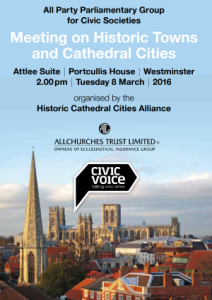 The IHBC’s new Branch and Event Support Officer Carla Pianese has, on behalf of the IHBC, offered her thanks to the Civic Voice for its recent All Party Parliamentary Group (APPG) on Civic Societies meeting, on 8 March, which was hosted in partnership with the Historic Cathedral Cities Alliance (HCCA), and which included an especially valuable thread on the role of Conservation Officers in delivering meaningful heritage benefits to local communities.
The IHBC’s new Branch and Event Support Officer Carla Pianese has, on behalf of the IHBC, offered her thanks to the Civic Voice for its recent All Party Parliamentary Group (APPG) on Civic Societies meeting, on 8 March, which was hosted in partnership with the Historic Cathedral Cities Alliance (HCCA), and which included an especially valuable thread on the role of Conservation Officers in delivering meaningful heritage benefits to local communities.
In a presentation by Richard Bates, reporting on research carried out by Green Balance, he noted that: ‘The message to the meeting from this research was that, whatever you or Historic England want to happen in respect of protecting heritage towns, it probably won’t happen unless more Conservation Officers are put in post first.’
Carla Pianese said of the event: The APPG for Civic Societies in collaboration with Historic Cathedral Cities Alliance was a great opportunity to share ideas about the present and future challenges facing historic towns and cities and the current drive for growth.’
The President of Civic Voice, Griff Rhys Jones, said that the civic movement is ‘anxious to see historic town preserved; change is going to come and we are interested in managing that change’. I can completely agree with this perspective, as it shows the complexity of future challenges in the sector, especially across historic and built environments where diverse and multiple stakeholders are involved.’
‘Lots of emphasis was given to enhance the role of Conservation Officers within Councils, as well as to the engagement of local and central government to raise awareness of current issues and influence future strategy and policy frameworks. And as Richard Bates will do a summary of his work in a forthcoming issue of Context, all will have an opportunity to understand the thinking behind his important message to the APPG.’
‘It was great also to see how Civic Voice and the HCCA were so especially supportive of IHBC ambitions to engage the next generation of professionals as volunteers across different levels of involvement with community-based works – as students and junior professionals as well as volunteers. I see this as a concrete opportunity for early career specialists to get a foot in door of the profession, offering as it does a mutual exchange of know-now between generations as well as real life experience.’
Civic Voice writes:
The event focussed on the challenges facing historic towns and cathedral cities and included presentations from a number of speakers including APPG for Civic Societies chair, Craig Mackinlay MP, Civic Voice president, Griff Rhys Jones, Duncan McCallum of Historic England, and Richard Bate, author of a major report on The Sustainable Growth of Cathedral Cities and Historic Towns.
The meeting offered an opportunity to hear about the current threats to historic towns and cities, to compare local experience with the national picture and to discuss what can be done to protect our heritage.
After the formal meeting of the APPG a less formal meeting of the HCCA took place, at which representatives of civic societies discussed the way in which this new body could develop.
Find out more about the meeting
View the video on YouTube
Explore the full IHBC Context online archive
For information on Context’s future issues, guidance for authors, and links to the journal’s archives see the IHBC website
Read more about Carla’s new role with the IHBC

 Another issue of the IHBC journal Context has been released online, No. 140, ‘Continuity and change in Northern Ireland’, edited by IHBC NI Branch Chair, Andrew McClelland.
Another issue of the IHBC journal Context has been released online, No. 140, ‘Continuity and change in Northern Ireland’, edited by IHBC NI Branch Chair, Andrew McClelland. The IHBC welcomes its newest staff member, Carla Pianese, recently appointed to help our volunteers, Branches, trustees and staff respond more effectively to current sector challenges, who can be reached through her new IHBC office email:
The IHBC welcomes its newest staff member, Carla Pianese, recently appointed to help our volunteers, Branches, trustees and staff respond more effectively to current sector challenges, who can be reached through her new IHBC office email: